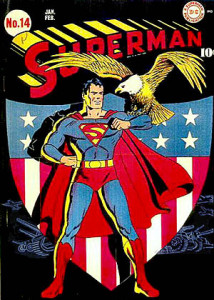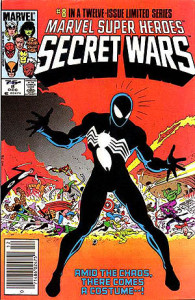Comic Books = Modern Mythology
Had an AWESOME time at ComicCon! Â I haven’t been inside the convention center since 2010, but I still went downtown to experience the festivities on Friday and Saturday! Â This popped in my head as I rode the trolley home surrounded by costumed freaks and geeks… In college, I took a couple classes in Classical Mythology… Â Greek Mythology and Roman Mythology. Â We read the classics like Homer’s The Odessey, Homer’s The Illiad, and Virgil’s The Aeneid. Â After a weekend at ComicCon, it dawned on me that modern comic books have themes that are very similar to Classical Mythology. Â You have:
- heroes and villans;
- heroes with super powers that need to commit “trials” to save people;
- “ordinary people” who step up and become extraordinary heroes (the hero’s journey).
There is definitely a structure to each hero’s journey and the heroic archetypes. Â Â I realized that there are so many similarities between modern heroes and the ancient heroes. Â Check out these similarities…
Superman: Hercules, invincible but with one weakness (cutting his hair=kryptonite)
Batman, Spiderman: Odesseus, Â tragedy breeds a call to action,
Superman, Luke Skywalker: Perseus, orphaned son with special powers
Alfred Pennyworth (Batman), Aunt May (Spiderman), Obi-wan Kenobi (Star Wars): Â The wise guide
X-Men: Â “imperfect” greek demi-gods with special powers
 Harvard Classics Professor Gregory Nagy explains it by saying, “It’s not that they were ‘believed’ . . . Rather, myths about heroes were accepted as valid narratives about moral truthsâ€.  In a way, comic books recreate these myths, but for different reasons.  In the “Golden Age” of comic books (late 1930’s to 1950s), the superhero archetype was created, and many famous characters debuted, including:  Superman, Batman, Captain America, Wonder Woman, and Captain Marvel.  The world needed heroes to look up to for World War II.
Harvard Classics Professor Gregory Nagy explains it by saying, “It’s not that they were ‘believed’ . . . Rather, myths about heroes were accepted as valid narratives about moral truthsâ€.  In a way, comic books recreate these myths, but for different reasons.  In the “Golden Age” of comic books (late 1930’s to 1950s), the superhero archetype was created, and many famous characters debuted, including:  Superman, Batman, Captain America, Wonder Woman, and Captain Marvel.  The world needed heroes to look up to for World War II.
In the Silver Age of comics, from 1956 to 1970, the popularity and circulation of comic books about superheroes declined following World War II.  Comic books about horror, crime and romance took larger shares of the market.  In contrast to previous eras, Silver Age characters were “flawed and self-doubting”.  Characters such as Spider-Man, the X-Men and the Hulk popped up during a time period of social upheaval and the rise of a youth counterculture in the 60’s. Comic book readers of the Silver Age were more scientifically-inclined than previous generations. Thus, comic books of the Silver Age explained superhero phenomenons and origins through science, as opposed to the Golden Age, which commonly relied on magic or mysticism.
 The Bronze Age of comics 1970-1985 was characterized by more mature and modern comic books.  More ethnically diverse characters were also created such as Marvel‘s Luke Cage (who was the first black superhero to star in his own comic book in 1972, followed a year later by Black Panther in Jungle Action), Storm, Blade, DC‘s Green Lantern John Stewart, Bronze Tiger, Black Lightning,Vixen, Cyborg and Monica Rambeau.  Characters such as Luke Cage, Mantis, Misty Knight, Shang-Chi, and Iron Fist have been seen by some as an attempt by Marvel Comics to cash in on the 1970s crazes for Kung Fu movies.  In the 70s, there were also a lot of  super hero Team ups / Cross overs.  I remember getting my first comics books in this period.  My parents actually let me subscribe to comic books via mail.  I’ll never forget the first comic book I got in the mail… The Amazing Spider-Man #238 where the Hobgoblin first appeared!  Part of me thinks it was a ploy for me and my brother to check the mail daily because as a kid, you very rarely receive anything in the mail box.  When we got mail it was exciting!  It worked because it got me reading and appreciating good stories.
The Bronze Age of comics 1970-1985 was characterized by more mature and modern comic books.  More ethnically diverse characters were also created such as Marvel‘s Luke Cage (who was the first black superhero to star in his own comic book in 1972, followed a year later by Black Panther in Jungle Action), Storm, Blade, DC‘s Green Lantern John Stewart, Bronze Tiger, Black Lightning,Vixen, Cyborg and Monica Rambeau.  Characters such as Luke Cage, Mantis, Misty Knight, Shang-Chi, and Iron Fist have been seen by some as an attempt by Marvel Comics to cash in on the 1970s crazes for Kung Fu movies.  In the 70s, there were also a lot of  super hero Team ups / Cross overs.  I remember getting my first comics books in this period.  My parents actually let me subscribe to comic books via mail.  I’ll never forget the first comic book I got in the mail… The Amazing Spider-Man #238 where the Hobgoblin first appeared!  Part of me thinks it was a ploy for me and my brother to check the mail daily because as a kid, you very rarely receive anything in the mail box.  When we got mail it was exciting!  It worked because it got me reading and appreciating good stories.
In the Modern Age of Comics (from the mid-1980s to present) we are seeing more of these stories in Pop Culture (popular culture) because the “hero’s journey” is constantly repeated yet still an entertaining escape from reality!  The super hero has evolved from socially moral god-like characters  in the 1930s to the modern anti-hero with particular character flaws.  Regardless, they have become a major source of entertainment in Hollywood because everyone can relate to them.  It’s no coincidence that many of the big summer block buster movies are comic book related… Spider Man, the Avengers, Batman, Superman… all with great super hero stories.  These stories are filed with classical mythology concepts.  These modern mythology themes makes me wonder how people in the future will look at our 20th Century Pop Culture and our “Modern Mythology”.
There is so much that can be learned by understanding origins of things… Â On the surface these comic book stories appear to be for kids, but in actuality they represent evolution of centuries of classic mythology. Â I found this great article online that discusses this deeper.